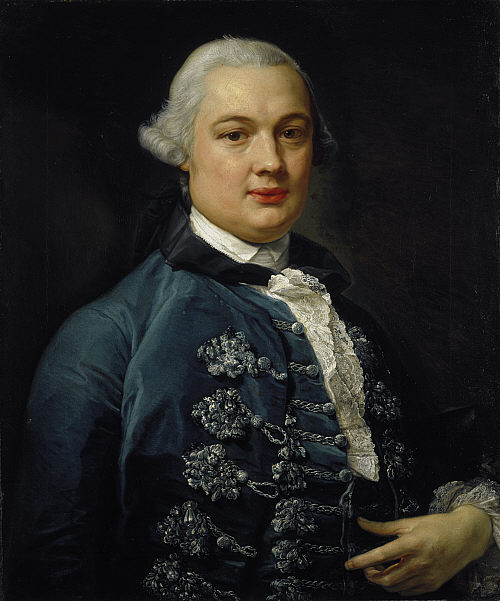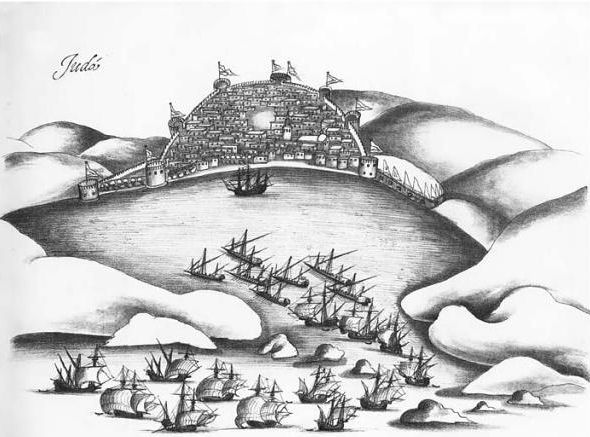|
Amara Dunqas
Amara Dunqas was the first ruler of the Kingdom of Sennar, which he ruled from 1504 - 1533/4. "Dunqas" is an epithet meaning "bent down, with an inclined head", referring to the way of how he required his subjects to approach him. According to James Bruce, he founded the city of Sennar after the Wad 'Ajib had been defeated by the Funj in a battle near Arbaji. Doing this he moved the seat of government of Wad ‘Ajib to Arbaji, that he might be more immediately under their own eye. Following the Ottoman conquest of Egypt in 1517, Amara Dunqas skillfully used diplomacy to keep the Ottoman armies from advancing further up the Nile and conquering his realm, thus securing the future of the kingdom. In 1523 the Jewish traveller David Reubeni passed through the territory of a king 'Amara, who is usually identified with Amara Dunqas. Two years later, Amara is briefly mentioned by the Ottoman admiral Selman Reis as the ruler of a kingdom, that, while described as requiring a three-mo ... [...More Info...] [...Related Items...] OR: [Wikipedia] [Google] [Baidu] |
Kingdom Of Sennar
The Funj Sultanate, also known as Funjistan, Sultanate of Sennar (after its capital Sennar) or Blue Sultanate due to the traditional Sudanese convention of referring to black people as blue () was a monarchy in what is now Sudan, northwestern Eritrea and western Ethiopia. Founded in 1504 by the Funj people, it quickly converted to Islam, although this embrace was only nominal. Until a more orthodox Islam took hold in the 18th century, the state remained an "African empire with a Muslim façade". It reached its peak in the late 17th century, but declined and eventually fell apart in the 18th and 19th centuries. In 1821, the last sultan, greatly reduced in power, surrendered to the Ottoman Egyptian invasion without a fight. History Origins Christian Nubia, represented by the two medieval kingdoms of Makuria and Alodia, began to decline from the 12th century. By 1365 Makuria had virtually collapsed and was reduced to a petty kingdom restricted to Lower Nubia, until finally di ... [...More Info...] [...Related Items...] OR: [Wikipedia] [Google] [Baidu] |
James Bruce
James Bruce of Kinnaird (14 December 1730 – 27 April 1794) was a Scottish traveller and travel writer who confirmed the source of the Blue Nile. He spent more than a dozen years in North Africa and Ethiopia and in 1770 became the first European to trace the origins of the Blue Nile from Egypt and Sudan. Early life James Bruce was born at the family seat of Kinnaird, Stirlingshire, and educated at Harrow School and Edinburgh University, and began to study for the bar, but his marriage to the daughter of a wine importer and merchant resulted in him entering that business instead. His wife died in October 1754, within nine months of marriage, and Bruce thereafter travelled in Portugal and Spain as part of the wine trade. The examination of oriental manuscripts at the Escorial in Spain led him to the study of Arabic and Ge'ez and determined his future career. In 1758 his father's death placed him in possession of the estate of Kinnaird. To North Africa On the outbreak of war ... [...More Info...] [...Related Items...] OR: [Wikipedia] [Google] [Baidu] |
Wad 'Ajib
Wad is an old mining term for any black manganese oxide or hydroxide mineral-rich rock in the oxidized zone of various ore deposits. Typically closely associated with various iron oxides. Specific mineral varieties include pyrolusite, lithiophorite, nsutite, takanelite and vernadite. Wad can be considered to be the manganese equivalent to the iron mineraloid limonite Limonite () is an iron ore consisting of a mixture of hydrated iron(III) oxide-hydroxides in varying composition. The generic formula is frequently written as FeO(OH)·H2O, although this is not entirely accurate as the ratio of oxide to hydroxide .... References * External links {{EB1911 poster, Wad Oxide minerals ... [...More Info...] [...Related Items...] OR: [Wikipedia] [Google] [Baidu] |
Funj
The Funj Sultanate, also known as Funjistan, Sultanate of Sennar (after its capital Sennar) or Blue Sultanate due to the traditional Sudanese convention of referring to black people as blue () was a monarchy in what is now Sudan, northwestern Eritrea and western Ethiopia. Founded in 1504 by the Funj people, it quickly converted to Islam, although this embrace was only nominal. Until a more orthodox Islam took hold in the 18th century, the state remained an "African empire with a Muslim façade". It reached its peak in the late 17th century, but declined and eventually fell apart in the 18th and 19th centuries. In 1821, the last sultan, greatly reduced in power, surrendered to the Ottoman Egyptian invasion without a fight. History Origins Christian Nubia, represented by the two medieval kingdoms of Makuria and Alodia, began to decline from the 12th century. By 1365 Makuria had virtually collapsed and was reduced to a petty kingdom restricted to Lower Nubia, until finally disap ... [...More Info...] [...Related Items...] OR: [Wikipedia] [Google] [Baidu] |
Arbaji
Arbagi, (or Arbaji), formerly Hellet Amara, is a town in the Al Jazirah, in Sudan Sudan ( or ; ar, السودان, as-Sūdān, officially the Republic of the Sudan ( ar, جمهورية السودان, link=no, Jumhūriyyat as-Sūdān), is a country in Northeast Africa. It shares borders with the Central African Republic t .... It lies opposite Rufaa on the left bank of the Blue Nile, 84.5 miles by road and 95 miles by river from Khartoum. There are several villages in the angle of the river which, however, are so close to one another that they may be considered as one. The town of Arbagi includes the site of the ancient city of Arbagi which is one of the oldest sites in the Sudan, and is mentioned by the learned Ludolphus in his history of Abyssinia. It was destroyed by the Shukria early in the 19th or at the end of 18th century. The population of Arbagi is chiefly sawarda Mahasis/ Ja'alin, Danagla and Batahin. At the turn of the twentieth century, Arbagi was under the O ... [...More Info...] [...Related Items...] OR: [Wikipedia] [Google] [Baidu] |
Ottoman Empire
The Ottoman Empire, * ; is an archaic version. The definite article forms and were synonymous * and el, Оθωμανική Αυτοκρατορία, Othōmanikē Avtokratoria, label=none * info page on book at Martin Luther University) // CITED: p. 36 (PDF p. 38/338) also known as the Turkish Empire, was an empire that controlled much of Southeast Europe, Western Asia, and Northern Africa between the 14th and early 20th centuries. It was founded at the end of the 13th century in northwestern Anatolia in the town of Söğüt (modern-day Bilecik Province) by the Turkoman tribal leader Osman I. After 1354, the Ottomans crossed into Europe and, with the conquest of the Balkans, the Ottoman beylik was transformed into a transcontinental empire. The Ottomans ended the Byzantine Empire with the conquest of Constantinople in 1453 by Mehmed the Conqueror. Under the reign of Suleiman the Magnificent, the Ottoman Empire marked the peak of its power and prosperity, as ... [...More Info...] [...Related Items...] OR: [Wikipedia] [Google] [Baidu] |
Egypt
Egypt ( ar, مصر , ), officially the Arab Republic of Egypt, is a List of transcontinental countries, transcontinental country spanning the North Africa, northeast corner of Africa and Western Asia, southwest corner of Asia via a land bridge formed by the Sinai Peninsula. It is bordered by the Mediterranean Sea to northern coast of Egypt, the north, the Gaza Strip of State of Palestine, Palestine and Israel to Egypt–Israel barrier, the northeast, the Red Sea to the east, Sudan to Egypt–Sudan border, the south, and Libya to Egypt–Libya border, the west. The Gulf of Aqaba in the northeast separates Egypt from Jordan and Saudi Arabia. Cairo is the capital and list of cities and towns in Egypt, largest city of Egypt, while Alexandria, the second-largest city, is an important industrial and tourist hub at the Northern coast of Egypt, Mediterranean coast. At approximately 100 million inhabitants, Egypt is the List of countries and dependencies by population, 14th-most populat ... [...More Info...] [...Related Items...] OR: [Wikipedia] [Google] [Baidu] |
Nile
The Nile, , Bohairic , lg, Kiira , Nobiin: Áman Dawū is a major north-flowing river in northeastern Africa. It flows into the Mediterranean Sea. The Nile is the longest river in Africa and has historically been considered the longest river in the world, though this has been contested by research suggesting that the Amazon River is slightly longer.Amazon Longer Than Nile River, Scientists Say Of the world's major rivers, the Nile is one of the smallest, as measured by annual flow in cubic metres of water. About long, its drainage basin covers eleven countries: the |
David Reubeni
David Reubeni (1490–1535/1541?) was a Jewish political activist, described by the ''Shengold Jewish Encyclopedia'' as "half- mystic, half-adventurer." Although some scholars are reluctant to believe his claims to nobility, citing suspicions of fraud behind such claims (in spite of Reubeni's unrelenting efforts to make an alliance between Christians and Jews against Muslims by the intermediation of the young king, John (João) of Portugal), in November of 1525 he was nevertheless given an audience with the king, accompanied with a letter of recommendation from Pope Clement VII, and had always insisted that he was the son of a deceased monarch (King Suleiman of Ḥabor), and that he was the Minister of that kingdom's War Department, now governed by his elder brother, King Joseph of Ḥabor. According to Reubeni's own story this kingdom had 300,000 "Israelite" subjects. The king of Portugal, impressed by the idea, had initially agreed to supply Reubeni with Portuguese arms, bu ... [...More Info...] [...Related Items...] OR: [Wikipedia] [Google] [Baidu] |
Selman Reis
Selman Reis was an Ottoman admiral and former corsair who was active in the Mamluk Navy of Egypt and later in the Ottoman Navy against the Portuguese in the first half of the 16th century. Selman Reis was originally from the Aegean island of Lesbos. ''The Ottoman Age of Exploration'' Giancarlo Casale p.39/ref> Mercenary for the Mamluk regime Selman Reis entered the service of the Mamluks, and led a group of 2,000 Levantines, against the wishes of the Ottoman Sultan Selim I. ''The Ottoman Age of Exploration'' Giancarlo Casale p.32/ref> Following the disruption of the spice trade between India and Mamluk Egypt by the Portuguese, Selman Reis led a Mamluk fleet of 19 ships into the Indian Ocean in 1515. He left Suez leading the fleet on 30 September 1515. ''An Economic and Social History of the Ottoman Empire, Volume 1'' by Halil İnalcik p.321''ff''/ref> The fleet also included 3,000 men, 1,300 of whom were Turkish soldiers. The fleet built a fortress in Kamaran, but failed to ta ... [...More Info...] [...Related Items...] OR: [Wikipedia] [Google] [Baidu] |
Bulletin Of The School Of Oriental And African Studies
Bulletin or The Bulletin may refer to: Periodicals (newspapers, magazines, journals) * Bulletin (online newspaper), a Swedish online newspaper * ''The Bulletin'' (Australian periodical), an Australian magazine (1880–2008) ** Bulletin Debate, a famous dispute from 1892 to 1893 between Henry Lawson and Banjo Paterson * ''The Bulletin'' (alternative weekly), an alternative weekly published in Montgomery County, Texas, U.S. * ''The Bulletin'' (Bend), a daily newspaper in Bend, Oregon, U.S. * ''The Bulletin'' (Belgian magazine), a weekly English-language magazine published in Brussels, Belgium * ''The Bulletin'' (Philadelphia newspaper), a newspaper in Philadelphia, Pennsylvania, U.S. (2004–2009) * ''The Bulletin'' (Norwich) * ''The Bulletin'' (Pittsburgh), a monthly community newspaper in Pittsburgh, Pennsylvania, U.S. * ''London Bulletin'', surrealist monthly magazine (1938–1940) * ''The Morning Bulletin'', a daily newspaper published in Rockhampton, Queensland, Austral ... [...More Info...] [...Related Items...] OR: [Wikipedia] [Google] [Baidu] |


.jpg)

